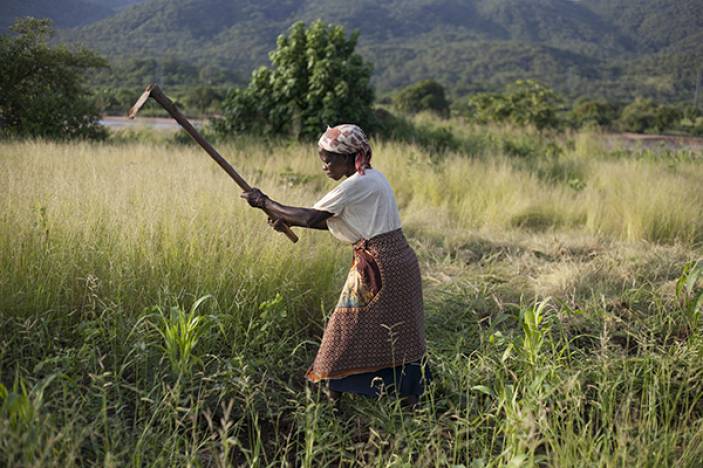
As member states and NGOs gather at the UN in New York next week for the 63rd session of the Commission on the Status of Women (CSW), we are urging a renewed commitment to adequate social protection for older women.
Around the world, many older women are struggling to survive on low incomes, while sustaining their families, and actively contributing to communities and economies through their work and care, which is often unrecognized and unpaid. Women are more likely than men to live in poverty throughout their lives, to be disempowered socially and economically, and have their rights denied. It is this historic disadvantage and injustice we need to redress, and CSW next week offers a golden opportunity for progress.
Social protection systems are crucial in ensuing income security throughout the life course and hold the potential to not only improve older women’s wellbeing and dignity, but also preventing and reducing poverty, inequality and social exclusion. Social protection can also facilitate access to important social services for older women, including health and care, which are key to achieving the Sustainable Development Goals.
Learning lessons from Kenya
In recent years, the concept and practice of social protection as a crucial tool for poverty reduction, inclusive economic growth and human development has rapidly gained ground. Kenya is one of the countries at the forefront of this global movement, and I am very proud to have been part of this progress towards equity and social inclusion.
In 2010, the right to social protection was enshrined in the Kenyan Constitution, and over the past decade, our government invested in various programmes, including a means-tested cash transfer for older persons aged over 65 years. However, this scheme did not provide sufficient protection for older Kenyans, especially the most vulnerable and marginalized. Older women who work mainly in rural and informal economies are particularly likely to be left behind.
This is why we worked hard to advocate for and implement a universal social pension that would provide basic income security to all older women and men in Kenya. We successfully engaged our colleagues in the Government of Kenya in advocating for a universal cash transfer programme for persons aged 70 years and above. We also led Kenyan delegations to engage actively in key global forums, including the UN Open-ended Working Group on Ageing and the development of the UN Convention on Rights of Persons with Disabilities.
In 2018, His Excellency President Kenyatta announced the roll-out of a universal cash transfer for all 833,000 Kenyan citizens aged 70 years and above, fully funded by the government with an annual allocation of USD 60 million. Beneficiaries receive USD 20 per month which is paid through four contracted local banks.
Of course, such a comprehensive programme presents challenges, and our solution is to embrace technology. We launched a digital citizen registry in 2016, and are committed to ensure all over-70s are registered and have access to pay points within 20 km where they live. Older people who are unable to make the journey nominate a trusted carer to collect money for them, so that no-one is left behind.
Rigorous evaluations are underway and initial evidence is showing that older women and men who receive the pension are living more dignified, independent and happier lives. We are continuing to improve the implementation of the programme, and also rolling out health cover for all beneficiaries. The scheme is known as Inua Jamii, a Swahili phrase meaning a ‘community moving forward’; we regard it as a vital investment to enable all citizens to live longer, healthier lives.
In Kenya, the number of people over 60 is expected to increase from just over 2 million today to around 9 million by 2050, or nearly 10% of the total population, so the potential benefits are huge.
Progress towards universal social pensions
Indeed, the whole world is undergoing this demographic revolution. Next year, the global population aged over 60 will reach one billion, and is projected to double again by 2050. Growth is most rapid in low- and middle-income countries, with far-reaching implications that governments are only now beginning to address.
Increasingly, other countries around the world are implementing non-contributory social pensions, often on a universal basis. Because they are not based on continuous participation in paid formal sector employment, they more accurately reflect women’s life-courses, and can effectively reach all older women, especially the marginalized.
As these are implemented, there is mounting evidence that universal social pensions are an effective and affordable way to expand pension coverage, especially in countries with high levels of poverty and informal employment. There is also a growing recognition that social pensions can bolster women’s economic autonomy, strengthen their voice and agency, and can be an effective way of recognizing the value of women’s unpaid work.
Affordability is a legitimate concern, but the experience of Kenya and other countries shows that universal social pensions can be funded if there is political will. The bigger question is whether we can afford not to be a global ‘community moving forward’ in reducing poverty, deprivation and inequality, and enhancing dignity, wellbeing, and human development.
We look forward to CSW next week in this hope it will marks a major milestone on the journey towards universal social protection for women of all ages, and a sustainable future for all.
……………………………………………………………………………………………………….
About the author
Cecilia Mbaka is Head of the National Social Protection Secretariat in Kenya’s State Department of Social Protection. She previously served as Head of the Division of Social Welfare and Older Persons and as founding Director of the National Council for Persons with Disabilities.
In 2017, she was awarded the Order of Grand Warrior by the President of Kenya in recognition of her achievements in advancing the rights of the poor and vulnerable, including older people. In 2018, she was appointed to the Board of HelpAge International.
